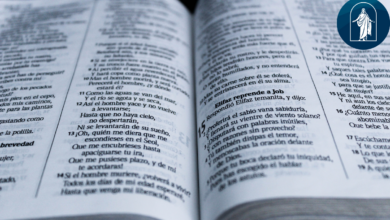The crying lasts a night Psalms: what does the verse say?
Crying lasts a night Psalms It is a much debated verse. The Psalms, a poetic and spiritual collection in the Old Testament of the Bible, offer words of comfort and wisdom to those facing difficulty.
Among these inspiring words, we find the verse: “Weeping lasts for a night, but joy comes in the morning” (Psalm 30:5). This simple phrase encapsulates a profound truth about the transitory nature of sorrows and the promise of a new dawn.
In this text, we will understand the meaning of this powerful verse and learn from its uplifting message. Read with us and understand crying lasts a night Psalms, let's go!
The crying lasts a night Psalms: what can we learn from this verse?
The powerful verse “Weeping lasts for a night, but joy comes in the morning” (Psalm 30:5) resonates deeply in our hearts, offering comfort in times of sadness and despair.
This passage transcends the ages, providing a message of hope and perseverance that continues to resonate with every generation.
In its simplicity, the verse teaches us the essence of human resilience. He reminds us that the dark nights of sadness are fleeting.
Just as the darkness gives way to the sunrise, our tears eventually dry, and joy returns to our lives. This message is deeply uplifting, encouraging us to face our darkest moments with faith, knowing that the light of happiness is on the horizon.
Furthermore, this verse teaches us about the inevitability of changes in life. He reminds us that just as the seasons change and night turns to day, our own circumstances are subject to change.
Regardless of the intensity of the sadness we face, this sadness is temporary. Joy, like the morning, always follows the darkest night.
In a deeper sense, the verse also reminds us of God's constant presence in our lives.
Even when we are immersed in tears, God is with us, holding us and guiding us through the darkness. He gives us strength to face our sorrows and comforts us with the promise of brighter days.
Ultimately, the verse “Weeping lasts for a night, but joy comes in the morning” invites us to trust in divine wisdom and the promise of hope.
It is a reminder that even in the most difficult times, we are sustained by God's unwavering love, which leads us from sadness to joy, from darkness to light.
Common questions
1. Who wrote Psalms?
The Psalms, that poetic and spiritual collection that has served as an inexhaustible source of inspiration throughout the centuries, were written by several authors, King David being one of the most prominent among them.
However, the authorship of the Psalms is diverse, covering different periods and experiences of the people of Israel.
In addition to David, other authors include Asaph, the sons of Korah, and other religious leaders. This variety of writers provides a wealth of perspectives, emotions, and human experiences, making the Psalms an authentic expression of humanity's spiritual journey.
They are a testimony to the depth of faith, struggles, worship and search for God, reflecting the full range of human experience before the divine.
2. How many Psalms did David write?
King David, known for his deep spiritual relationship with God, is traditionally credited as the author of approximately half of the Psalms found in the Book of Psalms in the Bible, totaling about 73 psalms.
These poetic compositions of David reflect a range of human emotions, from fervent expressions of praise and worship to laments and supplications in times of trouble.
The Psalms of David offer a window into the soul of a man who experienced triumphs and tragedies, providing spiritual guidance and comfort to readers throughout the centuries.
His ability to articulate the highs and lows of the human journey, coupled with his unwavering trust in God, makes his Psalms a timeless source of inspiration for all who seek a deeper connection with the divine.
3. What does Psalms mean?
The word “Psalms” originates from the Greek term “psalmos”, which translates as “music accompanied by string instruments”.
The Psalms are a collection of poetic songs and poems found in the Old Testament of the Bible.
They were originally intended to be sung or recited with musical accompaniment. The Psalms cover a variety of themes, including praise of God, pleas for help, lamentations, gratitude, and wisdom.
They represent an intimate expression of faith and devotion, serving as a powerful form of communication between worshipers and the divine.
In addition to their religious context, the Psalms also offer a rich source of poetic and spiritual literature, being appreciated for their emotional depth and their ability to touch the hearts of those who read or sing them.
Conclusion
Therefore, the verse “Weeping endures for a night, but joy comes in the morning” from the Book of Psalms encapsulates the essence of the message of hope and perseverance found in Scripture.
Regardless of the challenges we face, we can trust that sorrows are temporary and that joy will eventually follow.
Through the diversity of authors and experiences represented in the Psalms, we are reminded that our own emotional journeys are echoed in the inspired words of the Bible, bringing comfort, understanding, and, above all, hope to our lives. To the next!

